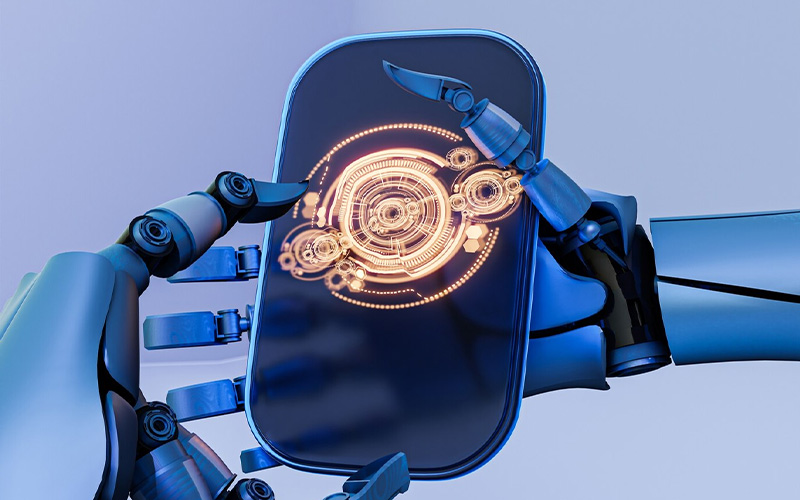Betting of the Future: AI-Generated Sports are Changing Market
A new niche is emerging at the intersection of innovative technologies and the rapidly evolving iGaming sector — virtual tournaments with matches simulated using artificial intelligence.
These digital competitions do not simply imitate sporting events — they form independent leagues and contests where teams, strategies, and results are created in real-time via AI algorithms.

About AI-Generated Matches
These are virtual competitions entirely generated by artificial intelligence in an online format — without the participation of real athletes and pre-set scenarios.
They differ from traditional simulations in their dynamics, unpredictability, and ability to be reproduced from scratch. Such features make them a breakthrough in the field of betting, interactive entertainment, and digital content.
According to SkyQuest, the online gambling and AI tournaments market is estimated at $12 billion in 2025. By 2032, it may increase to $38–45 billion with an annual growth rate of 17%.
Features of AI Contests
Dynamic and realistic competitions are created 24/7 based on machine learning algorithms, generative graphics, and analysis of sports statistics.
Key characteristics of such events that are based on artificial intelligence:
- Realism and credibility. Players' visualisation and actions copy the styles of real athletes, including movements and behavioural logic. Generative models (GANs and Diffusion Models) allow for impeccable accuracy in conveying the atmosphere of the stands and emotions of sportsmen.
- Unique experiences. Each competition is one-of-a-kind, even if its parameters (teams, level of players, and strategy) repeat themselves. The results of meetings are based on modelling probabilities and scenarios, not fixed animation.
- Instant rendering. Systems based on artificial intelligence are capable of organising tournaments on the fly. They immediately visualise the course of events, especially in the format of short meetings and fights at the request of gamblers.
How the AI Generation Mechanism Works
Key stages of creation:
- Collection and processing of information. Historical data on real players, statistics, and tactical models are applied here. Weather conditions, as well as the behaviour of teams and coaches, are studied too. Machine learning programs can additionally investigate the demographics of fans, game tension levels, league dynamics, etc.
- Simulation of actions. Neural networks are trained based on thousands of real matches, after which the algorithms predict the probable behaviour of athletes in each situation and reproduce their interaction taking into account the context and game scenarios.
- Generation of visual content. At this stage, 3D engines with AI animation support are used. Engineers apply Unity, ML Agents, Unreal Engine, MetaHuman, and other services. Video is created in the online format or semi-automatically, making broadcasts during bets or streams possible.
- The Provably Fair principle. It is suitable for crypto or hybrid systems. Algorithms make the generation of matches transparent and verifiable, so that customers may ascertain that the outcome is not falsified.
Technologies Driving Digital Sports Competitions
Key innovations that ensure the realism and credibility of simulations:
- ML/AI. Supervised and Reinforcement Learning approaches are used to predict the behaviour of participants and team strategies.
- GAN (Generative Adversarial Networks). They are applied to create video fragments and visual images based on training data.
- NLG. Natural Language Generation is responsible for the automatic voicing of events, comments, reactions of “spectators”, and the formation of post-match analytics texts.
- Real-time rendering systems. They provide instant visualisation with AAA-level graphics, maintaining high detail and dynamics.
- Blockchain and the Provably Fair concept. Distributed ledger technology guarantees the transparency of information and fairness during each digital match.
Why the New Format Works: the Main Advantages
Let us consider the key benefits of virtual sports contests using AI.
Availability and Unlimited Content

Entrepreneurs can launch tournaments 24/7, without taking into account the following:
- schedule of real leagues;
- weather conditions;
- cancellation of matches;
- athletes' vacations, and other factors.
Operators receive continuous traffic and betting turnover regardless of the time of day and location. This is especially valuable for emerging markets and mobile platforms.
Minimum Infrastructure Costs
A single engine can generate dozens of unique sessions per minute, without requiring arenas, judges, teams, and television contracts. Events are created instantly, and just as quickly resonate with the audience.
The implementation of AI-generated solutions reduces the expenses associated with content production and increases scalability. This makes the inclusion of tournaments based on artificial intelligence especially profitable for young entertainment brands and companies with a limited budget.
Growth of Engagement Indicators
AI engines can adapt the behaviour of teams and even the style of commentators to the interests of players. For example, VIP clients can receive a simulation of a contest for their favourite team with a dynamically changing scenario.
All this leads to an increase in LTV. Thanks to deep involvement, personalisation, and emotional attachment, a player feels that games were created personally for them.
Reliability and Fairness
Unlike simulations with a fixed outcome, AI-generated matches provide the ability to easily verify the results. The outcome of rounds is often determined by an algorithm with an open seed code, as in many blockchain casinos.
Support for the Provably Fair function builds customer confidence, especially in the crypto gambling segment and in regions with limited regulation.
Forecasted Economy and Fast Monetisation
AI matches allow entrepreneurs to quickly test different betting formats, odds, and marketing hypotheses. It is possible to scale any of the metrics through A/B tests without spending on the launch of a real tournament.
As a result, entrepreneurs receive more data, quickly localise the product and increase their profits.
Development in the Web3 Sector
In markets that do not have outstanding sports leagues or with an unstable political situation, AI matches are becoming a worthy alternative to traditional disciplines.
In metaverses and Web3 projects, contests based on artificial intelligence can be connected to the main gameplay. Another option is to add rounds to the Play-to-Earn mechanics, which increases audience engagement and business profitability.
Integration into the Betting Ecosystem
Sporting events modelled by AI are not just entertainment but an innovative vertical. The direction is quickly gaining popularity and works well in conjunction with classic bookmaker platforms.
Features of Connecting AI Content
Such innovative products are easily embedded in modern betting sites.
Integration formats include:
- live bids on AI matches, as in traditional sports;
- tournament tables and leagues functioning on generative models;
- personalised simulations for different player profiles (for example, VIP users);
- integration with NFT, Web3, and tokenised economy.
Nuances of Connecting AI competitions:
- Scenario engines and API. Content installation is smooth and fast. Solutions based on artificial intelligence create not only individual sports sessions but also entire leagues, championships, and careers of top athletes. All this allows operators to build a long-term audience engagement funnel.
- Types of bets. Tournaments support classic bets: 1x2, total, handicap, goals, and other types of bids. It is also possible to generate unique events, for example, “will there be a disputed penalty”, “a key player’s injury”, etc.
- UX/UI shell. It is essential for business owners to prioritise a strong visual component. 3D graphics, replays, commentators, interactivity, and other components are usually borrowed from gambling and eSports. It is possible to use a personalised interface where clients will select their favourite team, customise the style of presentation, and receive AI recommendations on bets.
Integration Prospects

Sports simulations based on artificial intelligence are not just an alternative to real entertainment but a new category of digital matches. With appropriate regulation and customer trust, they can take up to 20–30% of the betting market by 2027.
Decisive factors affecting the segment’s growth:
- Continuity. Tournaments are available 24/7, even outside of seasons.
- Scalability. It is possible to easily generate dozens of leagues and championships in a matter of minutes.
- Unique content. A promising direction is the development of competitions based on people’s demands (language, playing style, and other parameters).
- High engagement. AI commentators, spectacular repetitions, and eSports aesthetics enhance retention indicators.
Juridical Aspects and Risks
Currently, sporting events created using artificial intelligence face a variety of legal issues:
- Lack of a regulatory framework. In most countries, bids on AI simulations are not classified as competitions or gambling activities in the classical sense.
- Transparency of algorithms. Operators are required to disclose the principles of generation and guarantee the absence of manipulation.
- Game certification. Content requires an assessment of compliance with RNG standards, especially in the EU and the UK. GLI, eCOGRA, and iTech Labs are already starting to offer audits of AI products. The main problem is that behavioural technology of this kind is not always deterministic, which creates risks of bias or errors.
- Consumer protection. It is important for entrepreneurs to inform users that they are not placing bets on the outcome of real events.
Malta, the Isle of Man, Gibraltar, and other offshore jurisdictions are actively working on updating the legislation on virtual AI content. At the moment, there are discussions about including simulators based on artificial intelligence in the expanded list of regulated verticals.
The UK Gambling Commission (UKGC) requires:
- separate certification of virtual products;
- full disclosure of the generation model;
- publication of transparent odds;
- warnings about the absence of a real match.
Italy and France also limit the implementation of contests developed using AI technologies. This content is subject to individual approval by local authorities.
How Top Providers Create AI Tournaments
Let us look at examples of market leaders:
- Beter. The company's flagship project Beter Virtuals offers a wide range of settings for generating sports games on demand 24/7. AI is used to simulate football, tennis, and basketball matches with live odds. The provider applies behavioural patterns and statistical tools, creating unique and attractive content.
- Kiron Interactive. The proprietary Kiron Virtual Sports platform blends animation with AI modelling to organise realistic sporting events. The built-in engine determines the actions of players and the tactical rebuilding of teams. Supported disciplines: horse, greyhound, and car racing, as well as football leagues.
- Highlight Games. Soccerbet's proprietary system combines real archive footage with event and odds generation. The finished content has authentic scenarios and design, largely due to the use of genuine fragments of matches, for example, with the participation of Serie A or Bundesliga clubs.
- BetGames. The company has been implementing AI dealers and entertainment in live format for several years. Its main task is to develop a hybrid service in which virtual commentators and a special engine will simulate play situations in real-time. BetGames uses behaviour analysis based on artificial intelligence for betting, however, only in the case of closed testing.
- 1x2 Gaming. The brand’s 1X2 Network division is working on the creation of the Virtual Football Pro innovative fantasy simulator. The project is aimed at White Label operators and entrepreneurs who provide services in emerging markets. In Virtual Football Pro, the described technology is used on demand: to organise individual meetings.
The Main Thing About AI Sports Tournaments

Artificially generated events are becoming a new source of high-quality and original content for the iGaming industry.
Key aspects that operators should take into account:
- The solutions are highly realistic, instant rendering, and unique scenarios. This makes them an attractive alternative to traditional sports, especially in jurisdictions with simplified licensing and certification requirements.
- The product's advantages include accessibility, independence of the seasonality, and minimal infrastructure costs. Virtual AI contests guarantee increased marginality due to full controllability of the process and quick monetisation.
- Leading providers include Beter, 1x2 Gaming, BetGames, and other companies that are actively implementing advanced technologies.
The 2WinPower studio offers a full range of modern solutions for scaling entertainment businesses: Telegram and blockchain casinos, crash content, security software with biometric support, AI-based fantasy sports portals, etc.
- e-mail: info@2wpower.com
- Telegram: @Win2Power
Please be careful! We have noticed that scammers are using our contact details to deceive customers.
For security reasons, please use only the contact information provided on the page https://2wpower.com/en/feedback
Our company is not responsible for the actions of fraudsters.












 DEMO
DEMO 



